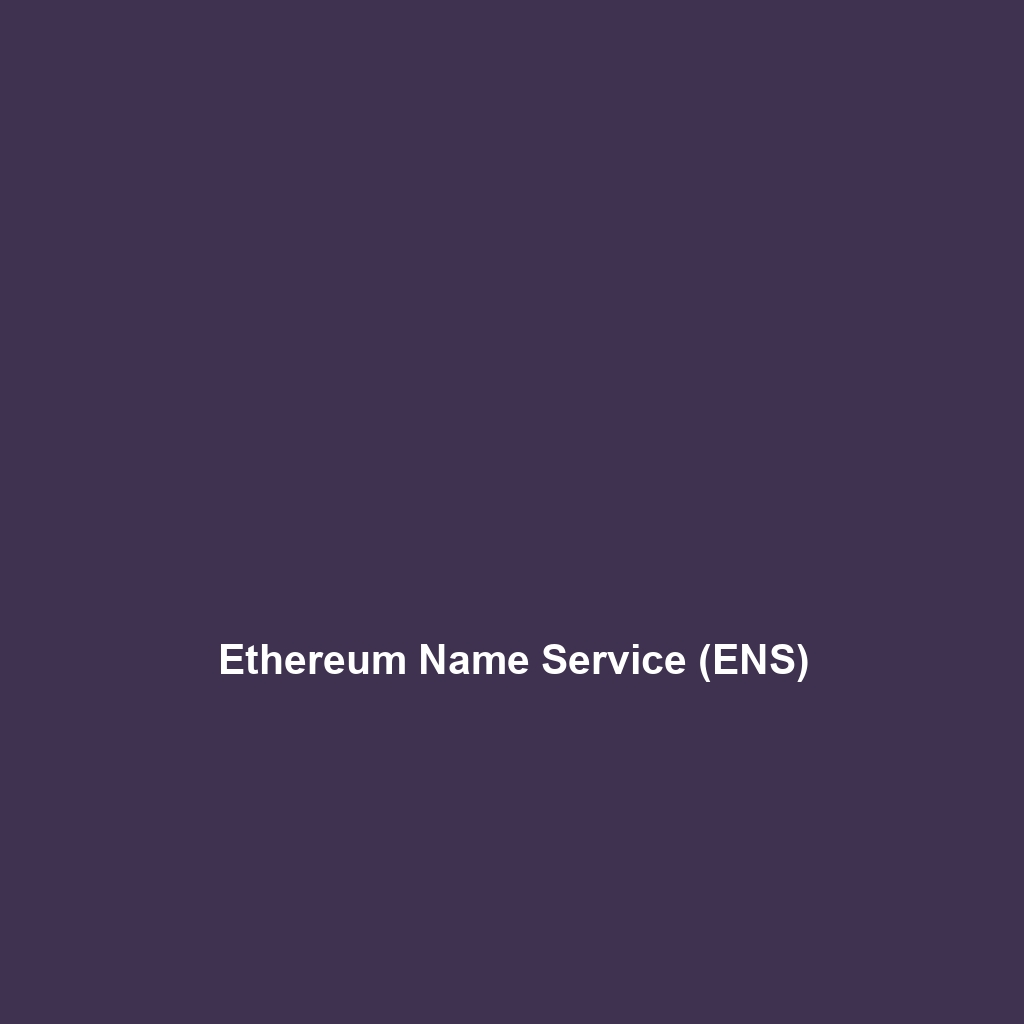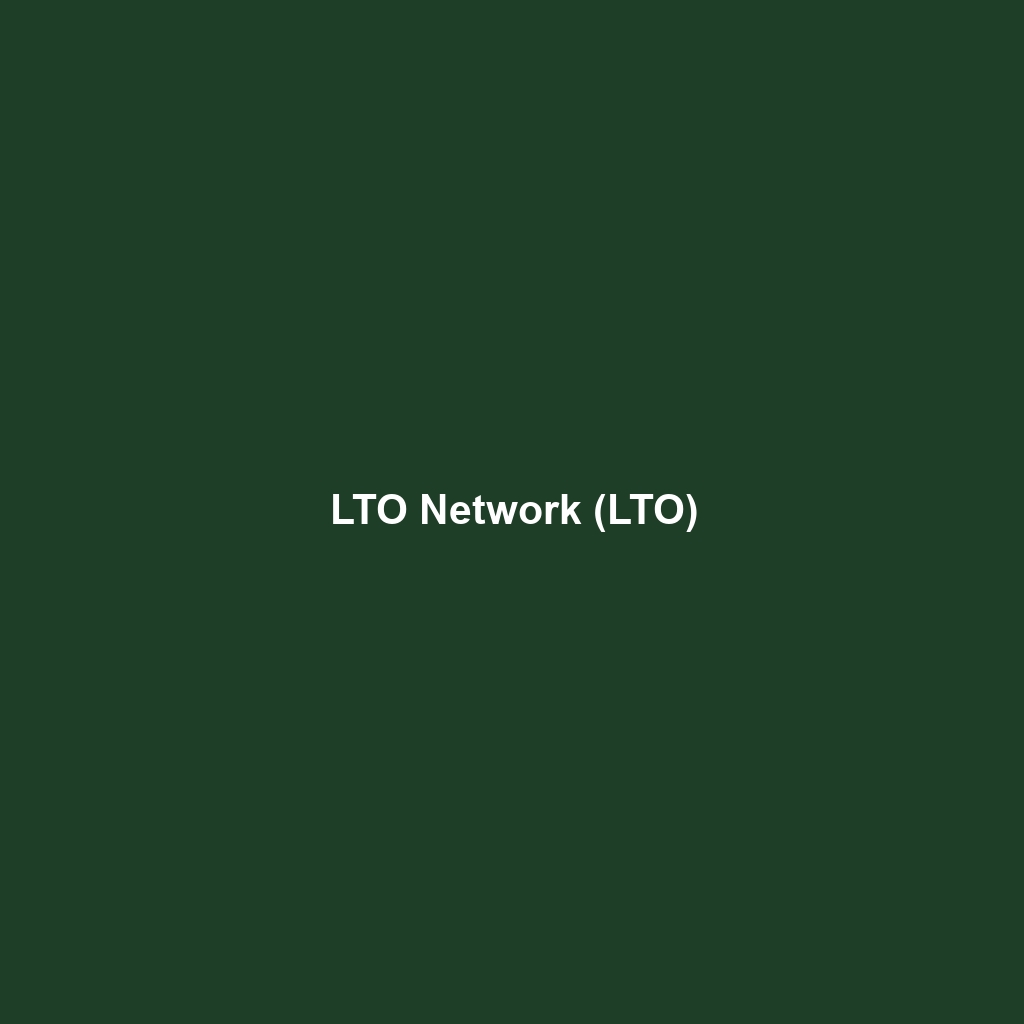Your cart is currently empty!
Tag: digital identity

Ethereum Name Service (ENS)
Ethereum Name Service (ENS): A Comprehensive Overview
Name and Ticker Symbol: Ethereum Name Service, commonly referred to by its ticker symbol ENS, is a significant player in the cryptocurrency market.
Founders, Launch Date, and History
Ethereum Name Service (ENS) was founded by Nick Johnson and Alex Van de Sande, with its development beginning in 2017. ENS was officially launched in May 2017. Since its inception, it has reached various milestones, including the introduction of the .eth domain and the ENS governance token launch in November 2021. The project has steadily gained traction, playing a crucial role in simplifying blockchain interactions through human-readable addresses.
Blockchain Platform
ENS operates on the Ethereum blockchain, functioning as a decentralized naming system. It can be classified as a layer 1 solution, providing essential domain name services that enhance the functionality of the Ethereum network.
Purpose and Use Case
Ethereum Name Service was created to provide an efficient way to manage blockchain addresses. Its primary use cases include:
- Simplifying cryptocurrency transactions by allowing users to send crypto to an easily memorable name instead of a lengthy address.
- Decentralized identity provision for users, enabling unique digital identities across various platforms.
- Blockchain website hosting through .eth domains, facilitating the creation of decentralized applications (dApps).
Technology and Consensus Mechanism
ENS leverages the smart contract capabilities of Ethereum, employing a Proof of Stake (PoS) consensus mechanism following Ethereum’s transition from Proof of Work. This shift enhanced security and energy efficiency within the ENS ecosystem.
Supply and Tokenomics
ENS has a unique tokenomics model with a maximum supply of 100 million ENS tokens, which are used for governance and protocol development. At present, the circulating supply remains dynamic due to the staking and burn mechanisms integrated into the platform. Token holders can stake their tokens to earn rewards and participate in governance decisions about the future of ENS.
Use Cases and Adoption
ENS has found real-world applications across various sectors, including:
- Payment solutions and wallets that integrate ENS for transaction ease.
- Decentralized applications (dApps) that utilize ENS for identity management and domain services.
- Partnerships with notable DeFi projects, enhancing the user experience by using human-readable domains instead of alphanumeric addresses.
Market Performance and Metrics
As of now, ENS has achieved a market capitalization of roughly $1 billion, reflecting increasing interest and investment in the token. Historical price trends exhibit notable volatility, typical of many cryptocurrencies. Recent trading volumes average around $100 million, highlighting active engagement in crypto trading.
Where to Buy and Trade
ENS can be purchased and traded on various platforms, including centralized exchanges (CEXs) such as Coinbase, Binance, and decentralized exchanges (DEXs) like Uniswap. These platforms allow users to acquire ENS through various trading pairs.
Security and Risks
ENS prioritizes security through its decentralized architecture; however, like any cryptocurrency, it is not without vulnerabilities. Past hacks affecting similar projects underscore the importance of thorough due diligence in the crypto space. Regulatory risks remain prevalent, as governments worldwide develop frameworks for oversight in the cryptocurrency domain.
Community and Governance
ENS operates using a community-driven governance model, where ENS token holders can propose and vote on changes within the ecosystem. This model fosters community engagement, allowing users to play a direct role in shaping the platform’s future.
Competitors and Differentiation
ENS faces competition from other naming services like Handshake and Namecoin. However, ENS differentiates itself through its deep integration with the Ethereum ecosystem, widespread adoption, and advanced features that cater specifically to Ethereum users.
Roadmap and Future Developments
Looking forward, ENS has a roadmap that includes potential upgrades to enhance functionality and user experience. Ongoing partnerships with other DeFi projects aim to improve interoperability and broaden the scope of applications using ENS.
Wallet Compatibility
ENS is compatible with a variety of digital wallets including MetaMask, Ledger, and Trust Wallet, enabling users to manage their ENS assets securely and conveniently.
Regulatory and Compliance Status
ENS must navigate an evolving regulatory landscape. As regulations around cryptocurrencies tighten, ENS actively seeks compliance to mitigate legal challenges that could impede growth.
Recent News and Updates
Recently, ENS secured strategic partnerships and introduced new features enhancing user interactions on the platform. The community has been abuzz with discussions about upcoming developments that aim for broader adoption and user-friendly experiences.
Summary and Call to Action
Ethereum Name Service (ENS) is a pivotal component of the blockchain landscape. With its innovative approach to domain names and commitment to decentralization, ENS is well-positioned for future growth in the evolving cryptocurrency market. For those interested in the ongoing developments of ENS or the broader implications of such technologies, tracking ENS’s progress is worthwhile.
For additional insights, visit UpCube.net. Also, explore the cryptocurrency€„¢s official website for more information.

Civic (CVC)
Civic (CVC) Cryptocurrency Overview
Name and Ticker Symbol: Civic is a cryptocurrency that operates under the ticker symbol CVC.
Founders, Launch Date, and History
Civic was founded by Vinny Lingham and Jordan Fried in 2017. The project was launched to address the growing concerns regarding identity theft and data protection as digital identities become increasingly valuable. The Civic platform has achieved significant milestones, including the successful completion of multiple fundraising rounds, culminating in its ICO in June 2017, which raised approximately $33 million. Since its inception, Civic has continued to evolve, focusing on decentralizing identity verification and building a robust ecosystem for secure digital identity management.
Blockchain Platform
Civic operates on the Ethereum blockchain platform, known for its smart contract capabilities. As an Ethereum-based project, Civic benefits from the robust security features of the blockchain while offering a layer of identity verification and authentication services.
Purpose and Use Case
The primary purpose of Civic is to enable secure and private identity verification. Its primary use cases include:
- Identity Verification: Providing identity verification services to businesses and individuals.
- Access Control: Enabling secure access to services without revealing unnecessary personal information.
- Decentralized Identity Management: Allowing users to control their own identity data without reliance on centralized entities.
Technology and Consensus Mechanism
Civic leverages Ethereum€„¢s smart contract capabilities to facilitate secure identity verification processes. The consensus mechanism employed is Proof of Work (PoW), transitioning into Proof of Stake (PoS) in the Ethereum 2.0 upgrade, which enhances energy efficiency and increases scalability.
Supply and Tokenomics
The maximum supply of Civic tokens (CVC) is capped at 1 billion tokens. The current circulating supply is approximately 685 million CVC tokens. The tokenomics includes a staking mechanism that rewards users who hold and stake their CVC tokens to support network security and operations. Additionally, Civic has implemented a burn mechanism to decrease supply and potentially increase the token€„¢s value over time.
Use Cases and Adoption
Civic has partnered with various businesses to offer identity verification services, including security firms, gaming companies, and financial institutions. Real-world applications include:
- Financial Services: KYC compliance and identity verification for banks.
- Healthcare: Secure access to sensitive patient data.
- Online Services: Enhanced user security for online accounts.
Market Performance and Metrics
Civic (CVC) has shown fluctuations in market performance since its launch. Its market capitalization typically ranges in the hundreds of millions of USD. Historical price trends indicate occasional peaks, with significant trading volume spikes during major announcements or partnerships. The cryptocurrency demonstrates typical volatility associated with the crypto market, influenced by broader economic sentiments and specific project developments.
Where to Buy and Trade
CVC tokens can be purchased and traded on several centralized exchanges (CEXs) such as Binance and Kucoin, as well as on decentralized exchanges (DEXs) like SushiSwap. These platforms provide liquidity and facilitate seamless trading experiences for CVC holders.
Security and Risks
While Civic has implemented robust security measures, like any cryptocurrency, it is not immune to risks. There have been instances of vulnerabilities in smart contracts, but to date, the Civic platform has not been subject to major hacks. Ongoing regulatory scrutiny in the crypto space poses potential legal challenges that could affect operations and compliance.
Community and Governance
Civic operates with a focus on community engagement, employing a decentralized governance model that allows token holders to vote on key decisions affecting the platform€„¢s future. This encourages transparency and fosters a collaborative environment where stakeholders have a say in project developments.
Competitors and Differentiation
Civic faces competition from other identity verification solutions like uPort and SelfKey. However, Civic differentiates itself through its established partnerships and a user-friendly interface that simplifies identity verification processes for both individuals and businesses.
Roadmap and Future Developments
Looking ahead, Civic has outlined plans for further enhancements to its platform, including expanded partnerships, improved user features, and increased focus on compliance with evolving regulatory landscapes. Future developments could enhance Civic’s ability to serve various industries more effectively, solidifying its position in the identity verification market.
Wallet Compatibility
Civic tokens can be stored in various cryptocurrency wallets, including popular choices such as MetaMask and Ledger. These wallets provide secure environments for holding CVC tokens while allowing users to interact with the Civic platform.
Regulatory and Compliance Status
Civic has actively engaged with regulatory bodies to ensure compliance with legal standards concerning data protection and identity verification. Challenges include navigating the differing regulations across jurisdictions, which may affect its operations.
Recent News and Updates
Recently, Civic has announced partnerships with several fintech companies to broaden its impact and service offerings. Additionally, upgrades to its platform, aimed at improving user experience and data security, have been key focal points in the latest updates.
Summary and Call to Action
Civic (CVC) represents a unique solution in the rapidly evolving landscape of digital identity verification. Its innovative approach, strong partnerships, and commitment to user privacy position it as an essential cryptocurrency worth following. For anyone considering engaging with blockchain technology and DeFi, tracking Civic’s developments could present valuable opportunities.
For additional insights, visit UpCube.net. You can also find more information on Civic through their official website.
